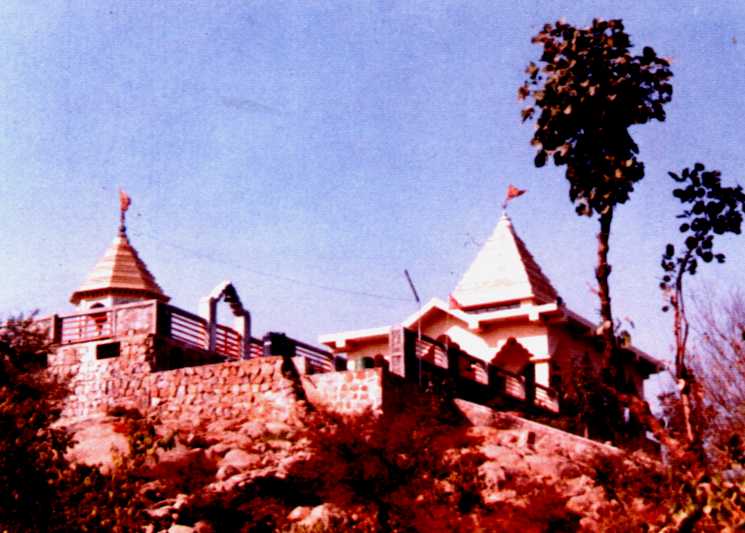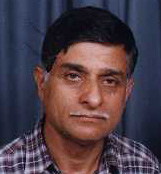|

|

|
|
Kashmiri Pandits' Association, Mumbai, India |

|
| | Home | April-May 2003 Issue | |
|
Stories
for the Children …
M.K. Raina Three
Questions
Thousands of years
ago, there was a state in Bharatvarsha, called Batsala. Arunagiri was its
capital.
For a
long time after their marriage, Maharani Vasundhara did not bear any child.
Medical advice was sought from the royal physicians but to no avail. Rituals
were performed in order to appease the deities at the instance of learned
Brahmins, but they were of no consequence. Maharani Vasundhara was desperate.
Maharaja, though himself very upset, consoled her saying that it was probably
the wish of gods. Still they prayed fervently for a child, successor to the
throne.
It was
early Spring. Maharaja and Maharani were taking a stroll along the stream
flowing by the side of the Rajmahal. Mahamantri Sura was following them at a
distance. Maharaja heard some noises coming from the gate of the Rajmahal. He
asked Sura to look into the matter. On
reaching the gate, Mahamantri found the royal guards questioning an old man. The
old man was requesting them to permit him to meet the king but the guards were
not relenting. Mahamantri asked him who he was and why he wanted to meet the
king. Old man said that he had come from a distant place only to meet the
Maharaja and reveal a secret to him. Convinced that the old man had something
important to reveal, Mahamantri let him in and promised him an audience with the
king. Maharaja Abhayadhiraj was informed about the old man's request. He issued
instructions that the visitor be immediately brought to the Durbar. He also
asked his Mahamantri and other ministers to be present.
The
old man was escorted by the chief of royal guards. He saluted the Maharaja in
the customary manner. Maharaja welcomed him and asked him who he was and why did
he want to meet him? The old man, introduced himself as Joginda, a yogi. He
said, he hailed from a distant place and that he wanted to make some
revelations.
Yogi
Joginda continued, “I have been meeting the people who visit your country off
and on and through them, I learned about your nobility and generosity. I always
desired to meet you but was waiting for an opportune time. When I heard that you
have no child to succeed your throne, I was pained. I decided to invoke the
blessings of Lord Brahma through Tapasya. At the conclusion of my Tapasya,
Lord Brahma appeared in my dream. He directed me to perform a 100 days
uninterrupted Yagna, to grant me a wish, which I did. Now I have come
here to tell you that Maharani Vasundhara will soon be blessed with a male
child."
Cries
of joy rented the air. Maharaja and Maharani were thrilled at this revelation.
Maharaja directed his Mahamantri to arrange free meals for a hundred Brahmins.
He gifted Joginda precious gems and requested him to stay on as royal guest for
a week. Maharaja personally looked after his comforts. Yogi Joginda was moved at
the Maharaja’s hospitality. While
departing from the palace, he said, "I shall come again to bless the
child."
In due
course of time, Maharani Vasundhara gave birth to a beautiful male child.
Rajmahal was illuminated and a free langar was arranged for the poor for
three days. Sweets were distributed among the friends and Rajmahal staff. A special emissary was sent to
yogi Joginda to inform him about birth of the child.
On his
arrival at Rajmahal, Joginda performed puja along with Maharaja Abhayadhiraj. He
blessed the child and named him 'Arisudana'. Joginda told the king and the
queen, "Rajkumar Arisudana should be crowned as successor to the throne
only when he attains the age of twenty. At the age of fifteen, he should be sent
outside the territory of Batsala in the garb of an ordinary person to seek
answers to the following three questions. 1) In what lies one's lasting
pleasure? 2) What is that which a woman loves most?
3) What is that which one can not hide for long?
Rajkumar should be given a maximum period of five year's to seek the
answers. He should be crowned as successor to the throne only if he gets all the
answers right".
"And
how do we know that he got the correct answers", asked Maharaja. Joginda
took a piece of bhojpatra, wrote something on it and wrapped it in a
piece of cloth. He made it into an amulet and handed it to the king. “Correct
answers are written here. It should be opened only after the Rajkumar returns
with the answers." Saying this, the yogi left. Maharaja secured the amulet
in the treasury vaults and relaxed. His successor was before him. He had nothing
to worry about, he thought. Rajkumar would definitely come up to his
expectations and get the right answers.
Rajkumar
Arisudana was brought up with lot of love and care. As he grew up, his parents
told him about the yogi and his three questions. Rajkumar wanted to leave
immediately but Maharaja and Maharani did not permit him as he had not attained
the age of fifteen.
On the
day of his 15th birthday, Rajkumar Arisudana rose early in the morning. He was
given a ceremonious bath. He then performed puja in the royal temple along with
his parents. A grand Durbar was organised on the occasion. He was seated on a
rosewood pedestal in the centre of the Durbar Hall while Rajguru chanted mantras
from the holy scriptures. Tilak was
applied on his forehead. He was then dressed in white robes like that of a
common man. Maharani offered him sweets and a glass of milk. Maharaja and
Maharani, both garlanded him. A pouch containing fresh and dry fruits, saamgri
for performing puja, Gangajal
and an additional set of clothes, was placed on his shoulder. He was now set to
leave the palace. Maharaja, Maharani, Mahamantri and Rajguru accompanied him. At
the palace gate, two decorated horse driven carriages were waiting. Maharaja,
Maharani and Rajkumar got seated in one and Mahamantri, Rajguru and others in
the second. These carriages drove them towards river Surbhi. People of Arunagiri
thronged both sides of the road leading to Surbhi. They were raising slogans and
praying for safe return of the Rajkumar. On reaching the river bank, they all
alighted from the carriages. Maharaja and Maharani embraced Arisudana and then
led him to a boat decorated with flowers. Arisudana took the oar in his hands
and waved to his parents and the people. Maharaja and Maharani stood motionless,
tears trickling down their eyes. They watched their prince rowing away till he
was out of their sight.
Next
morning, as the Sun sent its first rays into the palace, Maharani woke up. As
usual, she paid obeisance to the rising Sun. Arunagiri, the capital of her
kingdom Batsala, was so located as to receive the Sun's rays first. But this
morning was different from other mornings. Rajkumar Arisudana's absence was
being felt everywhere. Maharaja gathered courage or at least put a brave face
but Maharani was deeply distressed. She could not hide her grief. [[ Rajkumar Arisudana reached the
outskirts of his kingdom in the afternoon. He tied his boat to a tree, threw
away all flowers and garlands into the river, lest some one recognise him. He
set on foot towards an unknown destination. While on his way, he came across a
big shady tree and decided to take rest before proceeding further. He hung his
pouch on a branch and laid down. He soon fell asleep.
When
Rajkumar woke up, it was almost dusk. He noticed a stranger sitting beside him.
The stranger asked him who he was? In order to keep his identity hidden he said,
"I am Ananta. I hail from Batsala. I have set forth for the world outside
my country in search of a livelihood. Who are you and what is this village
called as?" The stranger said,
"I am Anusuya. This village is 'Rudraloka'. I hail from a village called 'Chandri'.
It is a day's journey from this place. I plan to spend the night in a temple
nearby and leave for my village early morning. You can accompany me if you so
wish." Rajkumar Arisudana, who was now Ananta, nodded in agreement. They
reached the temple after a short walk. Both of them had some fruits and milk for
dinner and decided to rest for the night.
Next
morning, after taking a bath and performing
puja in the temple, they left for Chandri village.
On the way Ananta noticed, Anusuya was not as old as he appeared the
previous night. He was probably middle aged, good looking, though lean.
During their journey, they ate whatever Ananta
carried in his pouch. They reached the village late in the evening.
Anusuya asked Ananta, "Where do you go now? You must be very tired. Why
don't you spend the night with me and leave for your destination tomorrow?"
Ananta readily agreed.
On
reaching his home, a small hut made of bamboo and hay, Anusuya called out to his
wife. A young lady appeared at the door. Anusuya introduced her as Pushpalata,
his wife and informed her that Ananta would be staying with them for the night.
Ananta observed that the place, though clean, clearly reflected the poverty of
its owner. Pushpalata, soon brought a bucket of hot water and washed their feet.
She then served them a good meal. After dinner Ananta stretched himself on the
floor and soon fell asleep.
On
waking up next morning, Ananta did not find Anusuya around. He enquired with
Pushpalata. She told him that Anusuya had left for the fields at dawn. She also
told him that she had prepared flour cakes and soup for Anusuya, which she was
going to deliver to him. Ananta thought he could give some relief to Pushpalata.
So he volunteered to carry the food for Anusuya, to which Pushpalata agreed. She
added some more cakes and soup for Ananta. Anusuya was ploughing the land. He had only one ox and in place of the other, he had put himself. He was perspiring profusely. Looking at Anusuya's pathetic condition, Ananta thought to himself as to what could be the cause of Anusuya's extreme poverty? He became curious . He wanted to know more about Anusuya and help him. On seeing Ananta, Anusuya stopped and retired to a green patch. Both of them opened the pack and had the soup and the cakes. While they were having their lunch, Ananta broached upon the subject. Anusuya, finding a sympathetic friend, began narrating his life story.
|
|
|
JOIN US |
|
|


 Maharaja
Abhayadhiraj was the king of Batsala. He was a noble and pious man. Maharani
Vasundhara was his queen. She was very beautiful. Maharaja had won her in a
Maharaja
Abhayadhiraj was the king of Batsala. He was a noble and pious man. Maharani
Vasundhara was his queen. She was very beautiful. Maharaja had won her in a 

